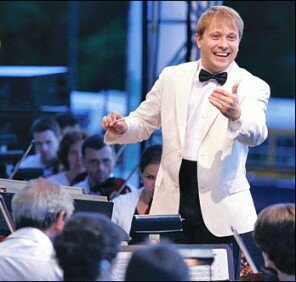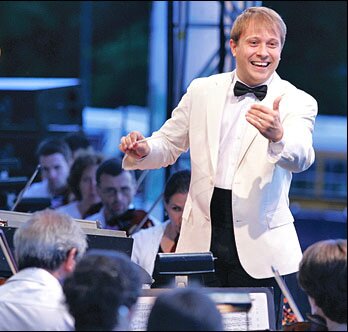Up next at Seattle Symphony is The Cocktail Hour: Music of the Mad Men Era, September 27-30.
If the overall impression given by last Saturday’s Seattle Symphony Gala concert was vitality, that given for last week’s opening concert of the regular season was one of color—vibrant, varied, rich colors in musical paintings.

Music director Ludovic Morlot was greeted with enthusiasm by both audience and players as he came out to showcase his orchestra in this concert, sans famous soloists.
Berlioz’ Roman Carnival Overture and one of two Debussy Nocturnes: Fêtes (Festivals), made a fascinating juxtaposition of two French composers’ ideas on street celebrations. Berlioz’ Roman one is almost rambunctious in its exuberance, pulsing with life. Debussy’s street procession starts much lighter-textured but is equally exciting and joyous as you hear it coming closer and closer then fading into the distance.
Morlot, French himself, brought out the nuances in both, as he did in the other of Debussy’s Nocturnes performed here, Nuages. This last is highly suitable for Seattle, being a musical description of gray clouds, the music nebulous as that sky but with bright moments.
As Morlot has intimated he will do, he is bringing to Seattle composers with whose music we may be less familiar. Thanks to well-designed programs, it is not driving audiences away to find a composer such as Bohuslav Martinů in the line up. This composer’s Symphony No. 6 was the central focus of Thursday’s concert.
It’s a 25-minute work with a motif which appears in all the movements of what sounds like the buzzing of bees flitting from instrument to instrument. The tuneful symphony seems to go along with quite conventional harmonies which suddenly disintegrate to reform quite differently. There’s a galloping urgency in the second movement and some moments reminiscent of Stravinsky in that and the syncopation in the third movement. It’s the sort of work which leaves the listener interested to hear it again, plus more of Martinů’s work, in order to become more familiar with his style. The orchestra was on its toes and the symphony received an excellent presentation from it.
Lastly came Respighi’s Pines of Rome, pictorial like the Berlioz and Debussy, this one being four vignettes of aspects around Rome. Again, color and musical portraits abounded from the shrill calls of children in the Pines of the Villa Borghese (complete with what sounded like wails from scraped knees), to the somber tones of the Catacombs. Finally came the powerful Pines of the Appian Way, with the low chords of the organ and the orchestra at full volume causing the floor of Benaroya Hall to vibrate.
Several orchestra members had solos which served to point out how good this orchestra is nowadays. Not only concertmaster Alexander Velinzon, but assistant principal cellist (in the absence of principal Efe Baltacigil) Meeka Quan DiLorenzo, English hornist Stefan Farkas and principal clarinetist Christopher Sereque plus others all played notable solos, expressively phrased, richly timbred, technically excellent.
Baltacigil is away touring as soloist with the Berlin Philharmonic under Sir Simon Rattle, performing the Bottesini duo concerto with his brother, New York Philharmonic principal bass Fora Balticigil. He will return to the Symphony shortly and will be soloist here the week of October 4 in Tchaikovsky’s Variations on a Rococo Theme. Subbing in the cello section is Karissa Zadinsky, the 17-year-old daughter of first violinist Arthur Zadinsky, possibly the youngest sub the orchestra has ever had.

Nothing like subjecting paying customers to a little nepotism. I suppose the symphony is unable to find any other PROFESSIONAL, experienced cellists in the Seattle metro area, and instead has to start taking subs from the amateur, youth symphony circuit.
Unfortunately it appears that the first violinist Zadinsky is taking advantage of his position within the orchestra. Is this kind of behavior we should expect from the Seattle Symphony, let alone pay for?
Dear musicfan44,
I always advise anyone to know their facts before posting such attacking and negative accusations on the Internet. When you do such things, and the truth finally comes out, it only makes you look bad. Look at the current fiasco with the awful terrorist attack in Libya. Truth and transparency is desperately needed. That is also the case with your comment.
Since you call yourself a music fan, I would hope that you have been to a performance of the Seattle Symphony at Benaroya Hall. If you have, you should know that the musicians are a wonderful group of people, and in my experience, are always happy to talk to audience members if they come up to the stage. I mention this, because if you had simply gone up to Ms. Zadinsky and asked her how she became a substitute, you would have instead made a comment praising her for her huge accomplishment, rather than assuming the worst.
Back in June of this year, there was an audition held at Benaroya Hall for anyone hoping to make it on the substitute list. The audition was held with candidates performing behind a screen, and Arthur Zadinsky was not a member of the listening committee. This is the standard procedure in the orchestra industry and there is no fairer way of determining who is qualified and who is not. That said, the fact that Ms. Zadinsky is appearing with the Symphony means that she must have ranked very highly at the audition. The world praised NBA stars like LeBron James and Kobe Bryant for going professional straight out of high school, so I would encourage you to show the same kind of support. I am personally very much looking forward to following the progression of what is sure to be her stellar career.
Warmest regards,
Truth2012
Sorry, truth and transparency *are* desperately needed.